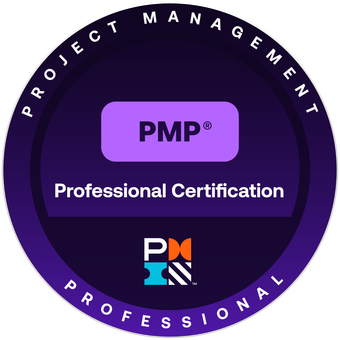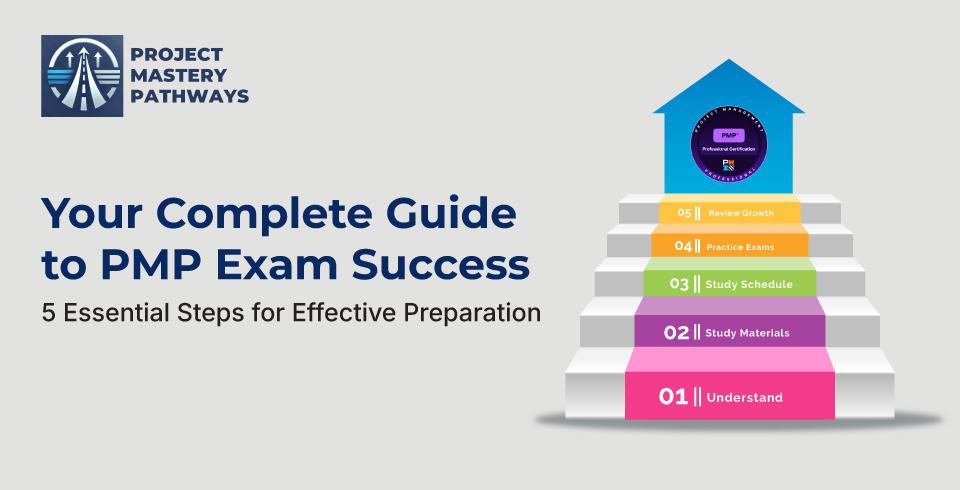Are you staring at the PMP certification requirements, feeling overwhelmed by the vast amount of material you need to master? You’re not alone. Many aspiring project managers find themselves paralyzed by the sheer scope of PMP exam preparation, unsure where to begin or how to structure their study approach effectively. The Project Management Professional (PMP) certification is one of the most prestigious credentials in project management, but without a strategic preparation plan, even the most dedicated candidates can struggle to pass this challenging exam.
The good news? Success in the PMP exam isn’t about cramming endless hours of study—it’s about following a structured, proven approach that maximizes your preparation efficiency. By the end of this guide, you’ll have a clear roadmap with five essential steps that will transform your PMP exam preparation from overwhelming chaos into a manageable, systematic process that significantly increases your chances of passing on your first attempt.
PMP Exam Prep Step 1: Understand the PMP Exam Structure and Eligibility Requirements
Before diving into study materials, you must first understand what you’re preparing for. The PMP exam consists of 180 questions that you’ll need to complete within 230 minutes, covering three main domains: People (42%), Process (50%), and Business Environment (8%). These domains reflect the modern, hybrid approach to project management that combines traditional and agile methodologies.
Domain Breakdown:
- People Domain: Focuses on leadership skills, team management, and stakeholder engagement
- Process Domain: Covers traditional project management processes, agile practices, and hybrid approaches
- Business Environment: Addresses organizational strategy, compliance, and project benefits realization
Understanding the PMP Certification Exam Eligibility Requirements is equally crucial. You’ll need either a four-year degree with 4,500 hours of project management experience and 35 hours of project management education, or a high school diploma with 7,500 hours of project management experience and the same 35 hours of education. Don’t overlook this step—many candidates discover eligibility issues too late in their preparation process.
PMP Exam Prep Step 2: Choose the Right Study Materials and Resources
The foundation of effective PMP exam preparation lies in selecting high-quality, current study materials. With the exam’s evolution to reflect modern project management practices, using outdated resources can actually hurt your chances of success.
Essential Study Materials:

- PMBOK Guide 7th Edition: While the exam draws from multiple sources, the PMBOK Guide remains a cornerstone reference
- Agile Practice Guide: Critical for understanding agile and hybrid methodologies
- Quality Prep Courses: Invest in comprehensive training that covers all exam domains thoroughly
The debate between PMBOK 6th vs 7th Edition for PMP Exam is common among candidates. The 7th edition’s principle-based approach better aligns with the current exam format, making it the preferred choice for 2025 exam takers.
Remember, your 35 PDU (Professional Development Unit) requirement can be fulfilled through formal project management training, which serves the dual purpose of meeting eligibility requirements while providing comprehensive exam preparation.
Step 3: Create a Realistic Study Schedule and Stick to It
Consistency beats intensity when it comes to PMP exam preparation. Most successful candidates dedicate 3-6 months to preparation, studying 1-2 hours daily rather than attempting marathon weekend sessions.
Sample 16-Week Study Plan:
- Weeks 1-4: Complete your 35 PDU training course
- Weeks 5-8: Read through PMBOK Guide and Agile Practice Guide
- Weeks 9-12: Focus on practice questions and identify weak areas
- Weeks 13-15: Intensive practice exams and review
- Week 16: Final review and exam confidence building
Consider factors like How Long is the PMP Exam when planning your preparation timeline. Understanding the exam duration and format helps you build the stamina needed for the actual test day.
PMP Exam Prep Step 4: Master Practice Questions and Mock Exams
This step often determines the difference between passing and failing. The PMP exam tests not just your knowledge, but your ability to apply project management concepts in situational scenarios. Practice questions help you understand the exam’s thinking pattern and identify knowledge gaps.
Effective Practice Strategy:
- Start with topic-specific questions after completing each study section
- Progress to full-length mock exams in your final month of preparation
- Analyze every incorrect answer to understand the underlying concept
- Focus on situational questions that require you to choose the “best” answer among multiple correct options
Understanding What Score Do You Need to Pass the PMP Certification Exam helps set realistic practice targets. The exam uses a proficiency scale rather than percentage scoring, making consistent practice crucial for building confidence.
Quality mock exams simulate the actual exam experience, helping you manage time effectively and reduce test-day anxiety. Look for practice tests that reflect the current exam format and difficulty level.
Step 5: Final Review and Exam Day Preparation
Your final weeks should focus on consolidating knowledge rather than learning new concepts. Create summary notes of key formulas, processes, and concepts for quick review. Practice time management strategies since the exam requires answering 180 questions in 230 minutes.
Final Week Checklist:

- Review your weak areas identified through practice exams
- Practice key formulas and calculation methods
- Ensure you understand PMP Exam Cost and Retake Cost implications
- Prepare all required documentation for exam day
- Plan your exam day logistics (location, timing, breaks)
Remember, the PMP exam tests your judgment as much as your knowledge. During the final review, focus on understanding the “why” behind project management principles rather than memorizing isolated facts.
Your Path to PMP Success Starts Here
Successfully passing the PMP exam requires more than just studying—it demands a strategic approach that combines comprehensive preparation with practical application. These five steps provide the framework for transforming your PMP certification goal into reality.
Ready to take your PMP exam prep to the next level? For detailed video explanations of complex project management concepts and exam strategies, subscribe to my YouTube channel PMPwithRay where I break down challenging topics into easily digestible lessons. Looking for comprehensive, structured PMP exam preparation? Check out my highly-rated PMP Certification Exam 35 PDU Training course on Udemy, designed specifically for aspiring project managers who want to pass their PMP exam on the first attempt. You can also enhance your practice with my PMP Certification Exam Mock Simulator to experience realistic exam conditions and build your confidence before the actual test.

